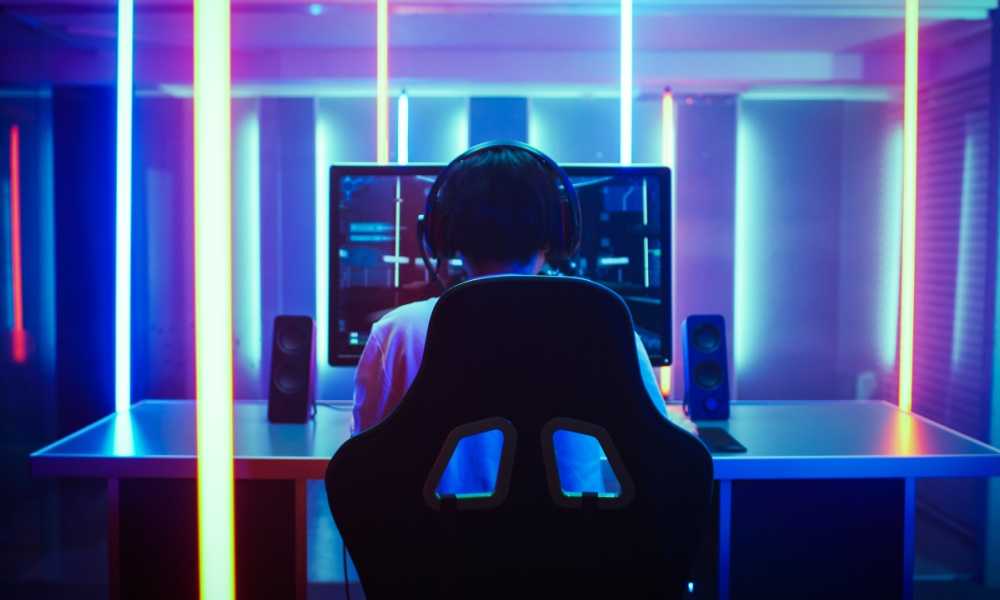Whether you are an amateur or a pro gamer, having a dedicated space for gaming is both fun and useful. With a video game room, you can not only set up your space in a way that is optimized for gaming, but you can leave it that way, and don't have to move or adjust anything when the room needs to be used for other purposes. And it's not as difficult as you may think to set up a game room, or even to simply set up a dedicated gaming space in a house.
Here is a List of the Basic Equipment You Will Need
A TV or projector
While it may seem like bigger is better, keep in mind that the TV should be scaled appropriately to your space. A giant TV is actually often better for movies than for games. We'll explain more about size and placement below.

Speakers
Speakers are an essential aspect of the gaming experience, and need to be in your gaming room setup.
Lighting
Lighting doesn't have to be elaborate or expensive, but lighting can either add to the gaming experience, or detract from it.
Wireless router
In a gaming room, it is much more convenient to have a dedicated Wi-Fi signal than to share a wireless connection with other devices or services that are running in the home.
Cables and cords
How many you have and how you manage them depends on how large your space is, but always have plenty. You need to be able to set up your space properly and have the cables fit your room layout, than have your setup confined to the length of your cables and cords.
And, of course, your console(s) and accessories.
Planning the Layout of Your Game Room
While every room and setup will be different, it's always best to plan your layout ahead of time. Make sketches of a floor plan, if necessary, so that you know where everything will go and how much space you will have. Here are the key considerations when planning your layout:
Position of the TV
The position and orientation of the TV will largely determine the rest of the layout of the space. If your room is rectangular, try to place the TV near a short wall, rather than a long one, for the best viewing angle and use of space. Try to place the TV so that it's not facing a window or light source, causing screen glare.
Position of your seating
After you have determined the placement of your TV, determine where you will place your couch or chairs for seating. Remember that your seating is ideally a comfortable distance from the screen, and that gaming requires a little more room than movies/home theater.
For gaming purposes, you should sit about 4 feet from a 32 inch screen, about 5.5 feet from a 40 inch screen, about 6.8 feet from a 50 inch screen, and so on. Keep in mind that you may need even more space in front of the TV if you intend to play gestural games, or you may need to be able to create more floor space on demand for VR games.

Place your speakers
After you have placed the TV and the seating, you can place your speakers. Speakers should be positioned beside the TV but a foot or two away from it on either side, angled to point at the couch or seating, with speakers at ear level height.
Also, while this is frequently diagrammed as a perfect equilateral triangle with the speakers in the corner aimed at the couch, you get better sound by not placing your speakers directly in a corner facing out at a perfect 45° angle. Have the speakers slightly closer to the TV than to the wall for the best sound.
Consider your lighting
Lighting makes the space look appealing and sets the tone, but good lighting can actually also improve your gaming experience and performance. Colored bulbs reduce glare and eye strain. Bias lighting behind the TV reduces eye strain and often improves picture quality. If you have the money, consider smart bulbs, wireless lighting, and remote control lighting options. If necessary, also look at blackout curtains for windows so you have ultimate control over the lighting environment.
After You Have Planned the Layout and are Satisfied With It
Consider the following:
Sound proofing
Game rooms can get loud, and the sound may be disruptive for other people. There are several inexpensive ways to reduce excess sound from your gaming room.
Cables and cords
Make a plan for cord length, placement, and management
Having cords well-organized and neatly out of the way is essential for the ultimate game room.
Once you've placed and mastered these essentials, your game room is ready for whatever other décor and amenities you need to have the best gaming experiences possible, every day.



